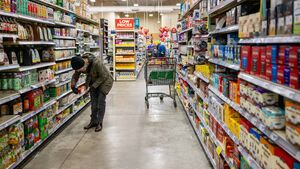American consumers feel the effects of Trump's trade war

A customer shops for produce at an H-E-B grocery store in Austin, Texas. US retailers are warning of empty shelves in the coming weeks as a result of President Donald Trump's 'Liberation Day' tariffs. Picture: Brandon Bell/Getty Images
The eponymous host of has long lost his incredulity for what passes as politics in the United States. His show on the unapologetically liberal-leaning cable news channel MSNBC is moderately popular, particularly within liberal and progressive circles. Since first airing in 2013, he has gathered a loyal following, especially among viewers who appreciate more in-depth, policy-driven analysis. Hayes has also been criticised for over intellectualising political issues, making his arguments less accessible to a broader audience. Yet that could hardly be said of his evening broadcast of May 6th, where he could not conceal his contempt for Donald Trump’s first 100 days in office.
In a scathing monologue, bordering on ridicule, the erudite news anchor mocked the president for not understanding the US economy in even the most basic way - as Trump recently compared it to “a super luxury store".
"A store that has the goods," said the President. "You're going to come and you're going to pay a price and we're going to give you a very good price. […] I can just set those terms and they can go shopping or they don't have to go shopping because everybody wants to shop here."
For anyone with even a basic knowledge of current economics, Trump has got it completely wrong and as Hayes underlines, it is the American consumers who are “the shoppers of last resort for the whole world".
"It's our money, our dollars that buy all the stuff, not the other way around," Hayes remarked.
While many powerful and wealthy people hear Trump's commentary on the US economy, the MSNBC host believes they have convinced themselves that he is bluffing and instead is positioning himself for trade negotiations with China, the EU and the many, many other countries targeted by his tariffs (including some islands just inhabited by penguins).
Meanwhile, the Trump administration cannot name a single trade deal, or confirm that China has actually entered negotiations over the tit-for-tat reciprocal tariffs levied on each other’s goods entering their respective countries. Indeed, Trump is getting fed up with being asked about it, exasperatedly telling a reporter to “stop asking how many deals are you signing this week?”, instead promising that someday he will announce “100 deals” before enigmatically adding: “And they don't have to sign.”
As Hayes pointed out, despite Wall Street’s optimism, Trump is insisting his trade plans will proceed claiming “the tariffs are going to be great for us because it's going to make us rich" - even while acknowledging that prices will also increase. He admitted as much on , admitting that some goods will cost more, including toy dolls.
"I don't think a beautiful baby girl that's 11 years old needs to have 30 dolls. I think they can have three or four dolls... they don’t need to have 250 pencils. They can have five."
Aside from the octogenarian’s delusion over what “baby girls” of 11 are playing with in 2025, Trump is clearly still unable to let go of his global tariff plan. His recent 90-day pause in their implementation, in reaction to the freefall of the stock market, is clearly just that - a delay. With the lack of evidence of any country - much less China - engaging with the United States in a meaningful way to mitigate these arbitrary taxes, it seems like America is already rushing headlong over the cliff edge — like Wile E. Coyote in the cartoon.
According to Hayes: “Right now, we are in a little bit of a false lull when it comes to Trump's trade wars. It's strange, surreal. Look, if you look at the markets, they've actually made back a lot of the losses from that tariff shock starting about a month ago, which is, I suppose, better than the alternatives. But again, I'm not sure it reflects the reality of the situation.”
He believes that very clever and very powerful people in politics and finance are unable to acknowledge that Trump would be so uniquely stupid and destructive to carry through his trade war, and are grasping at every slightly positive syllable uttered by his officials to suggest otherwise. Maybe they are right and the US President will quietly cave in - under pressure from deeply unfavourable opinion polls or a word in his ear from worried oligarchs - and blame others for the tariff roll-back while still declaring victory. However, as the bespectacled news host concludes: “It's basically the best-case scenario at this point”.
But like the Titanic, holed below the waterline by the iceberg, the damage could already be done and the coming recession (or worse) is inevitable. The port complex of Los Angeles, just off Long Beach, recorded a significant drop in cargo since Trump’s 'Liberation Day' tariffs announcement, with 35% reduction this week alone compared to 2024. Last year, almost a third of everything that came into or out of the US in shipping containers over water, came through here. Even if a deal was struck with China in the morning, it would take weeks for ships to again make their way across the ocean from Chinese factories. Remember, it was extensive supply-chain issues post-Covid that contributed to global inflation and likely doomed the election campaign of Joe Biden’s vice-president Kamala Harris.
Meanwhile, as retailers warn of empty shelves within weeks, well-known cosmetic brands are warning of increased costs, with the evidence now seen on the ground. At my wife’s shop, prices have already increased for cosmetic products coming from Europe, perhaps partly due to the weakening of the dollar against the Euro (also caused by Trump’s Liberation Day announcement). Customers’ frustration with this is palpable (with front-line staff bearing the brunt of their anger) while many clients are resigned to bulk-buying products which are likely to increase, including one woman buying 18 lipsticks worth $6 each or another buying four litres of shampoo. Some cosmetic shops have stopped placing price labels on products, expecting them to change in a city that already is one of the most expensive in the world to live in.
The utter daftness of this entire misadventure is that none of it needed to happen. Whatever anyone thinks of the globalisation of international trade and the off-shoring of thousands of manufacturing jobs over the decades to China from the US and Europe, this ill-conceived, unmerited decision to just unilaterally declare exorbitant taxes on foreign imports to the US will cause more harm than good - and it is already too late to reverse it. Thus, the question is not when will those in charge pull back from the cliff edge but instead, like Wile E. Coyote, when will they stop pedalling furiously, look down and realise there is a whole lot of nothing beneath them?
As I finish, Trump has just proudly announced “a full and comprehensive” trade deal with the UK, but which was described by University of Michigan Economics and Public Policy Professor Justin Wolfers on MSNBC as more ‘tiny little peas’, not even ‘small potatoes’, as Britain is only responsible for 3% of trade from the US - and which negotiations had begun even before Trump’s ‘Liberation Day’ announcement. The backsliding has begun.





